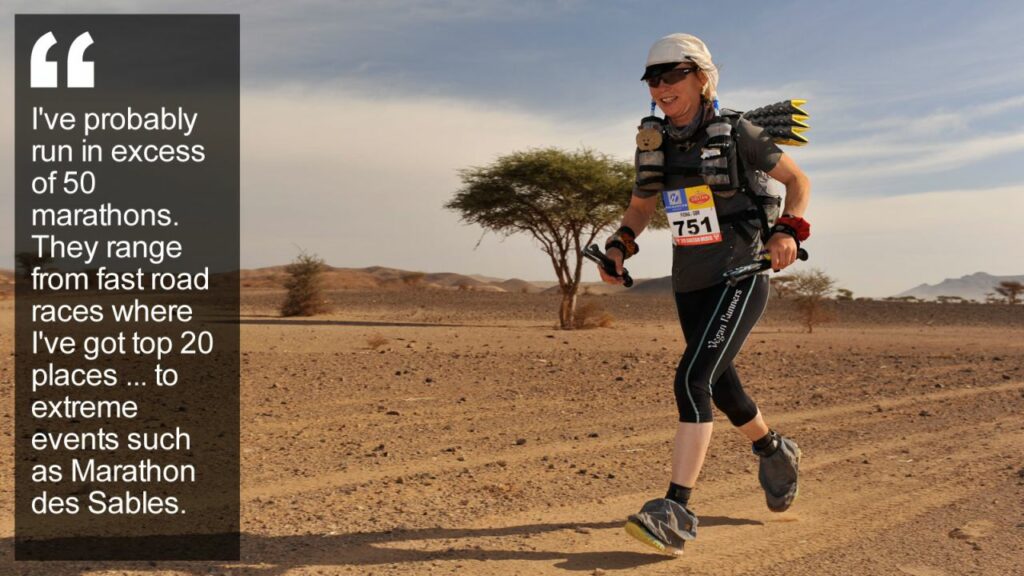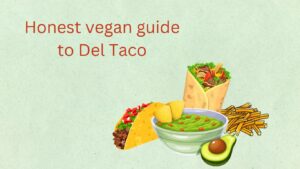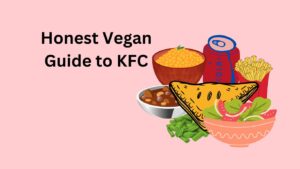Veganism is probably one of the most controversial topics in our society. While vegans claim that their lifestyle does not only benefit their health, but also the environment and, most importantly, animal welfare, skeptical people underline how this diet lacks fundamental nutrients and, therefore, cannot be healthy.
This is why top-world vegan athletes such as Fiona Oaks dedicated their lives to proving those voices wrong. “The non-vegans in my sporting and firefighting life can be very skeptical of my veganism,” said Fiona.“ But when they see what I can do that usually shuts them up.” But who is Fiona? And how is she supporting the vegan cause?

Meet Fiona Oakes
Fiona Oakes is a vegan marathon runner who broke several records throughout her career. She is the fastest female athlete to have run a marathon in each continent and has been holding the record for the Essex Country Marathon Championship since 2007. She is known for competing in extreme conditions and won the North Pole Marathon and the Antarctic Ice Marathon in 2013. She also finished the 2012 Marathon des Sables, an exhausting race of 155 miles in length during which competitors have to endure the suffocating weather condition of the Sahara desert.
“I lost six kilos in one week running it but this is rather extreme as it is 155 miles in the harshest desert conditions you can imagine, crossing the toughest terrain carrying a backpack with all your supplies, weighing around 12 kilograms,” said Fiona.
Apart from her sports achievements, Fiona works as a retained firefighter and is the founder of Tower Hill Stables Animal Sanctuary which, over the years, has become the home of over 400 rescued animals.
Veganism was never just a diet for Fiona.
“Veganism is everything to me. It touches every part of my life. It is my life. I could not begin to imagine living my life any other way. It’s not just the diet, but the lifestyle and the life choices I have made through my veganism, such as starting the Tower Hill Stables Animal Sanctuary and my Marathon running.”
But from where did this all begin?
Becoming vegan – an early start
Some people are born with musical talent, and others with a particular interest in science, but Fiona was all about animal rights and activism from the very first years of her life. It was in fact at the young age of roughly three years old that she decided that meat and fish could no longer be part of her diet.
“I decided to become vegetarian at the age of 3 or 4, as soon as I was able to make a conscious decision,” said Fiona. But despite her young age, Fiona remained vegetarian only for a few years and soon realized that veganism was the right choice.
“I became vegan at around 6 years old. It was just a natural progression from vegetarianism.”
The importance and benefits of a vegan lifestyle
When talking about the benefits of being vegan, Fiona doesn’t focus much on the health side, which she can easily showcase thanks to her several achievements, but prefers to discuss the ethics behind this choice.
“The health benefits of being vegan are written in stone but I honestly believe the most benefit to me being vegan is that I do not carry the burden of guilt that I would have to endure knowing that I abused others for my own ‘benefit’.”
Veganism, in fact, contributes to the gradual abolition of barbaric treatments through which the meat and dairy industries have been abusing animals for years. According to an article published by Animal Aid, one of the UK’s largest animal rights groups, every year in the UK roughly 4 million newborn baby lambs die within a few days due to the harsh weather conditions they have to endure, general malnutrition, and the spread of diseases. But lambs are not the only animals suffering from these brutalities.
Nowadays it is still common practice in most areas of the world to keep farm animals in incredibly small spaces and overcrowded areas. For instance, sow stalls and farrowing crates are used all over the globe to keep pigs alive while denying them enough space to move.
Veganism is also a positive choice when it comes to sustainability and the environment. Several studies have demonstrated how a plant-based diet is by far the best for slowing down climate change. This diet, compared to both vegetarian and omnivorous ones, results in lower rates of greenhouse gas emissions. This is why organizations such as Greenpeace stress the importance of cutting global meat and dairy production and consumption in half by 2050 to keep the Paris Agreement on track.
By doing so, we would also be able to reforest farmland now used as grazing pasture. According to a 2019 article published by Harvard Law School, reforesting these terrains in the UK alone would help remove 3,000 million tons of CO2, equal to nine years of UK CO2 emissions.
Despite these promising statistics, only a fraction of the total world population is currently vegan. This is mainly due to wrong assumptions such as the fact that a vegan diet may lead to a decline in muscle mass or be associated with poor health. This is why Fiona decided to dedicate her life to showing these people how vegans can not only be healthy but also endure the most exhausting physical challenges.
How does a vegan marathon runner train?

When it comes to training, Fiona doesn’t seem to be following any strict and highly planned routine. In fact, this incredible athlete doesn’t tend to put too much focus on losing, gaming weight, or toning up. According to her, her real training consists of her extremely active lifestyle. One of Fiona’s typical days begins at 3.30 am when she wakes up and starts her manual work either at her Tower Hill Stables Animal Sanctuary or working as a fire brigade. It is this active lifestyle that contributes to most of Fiona’s health together with her run training and healthy diet.
“I guess my energetic lifestyle is my cross-training. I only really train either with rowing on my Concept 2 rower or running,” said Fiona.
However, when a big event like a marathon is coming up, Fiona tends to change her routine slightly. She usually runs a maximum of 90 to 100 miles per week, equal to 144 to 160 kilometers, and split up her training into ten sessions divided between speed and endurance. Despite this, Fiona keeps stressing the fact that everybody is different, and what works for her may not work for other athletes.
“I always respond to anyone who is seeking advice regarding their running and combining it with a vegan diet but I always say that everyone is different and I can only tell them what has worked for me.”
Fighting misconceptions about vegans
“The most common question I get asked is ‘Where do you get those enormous muscles from?’ I answer ‘From my wonderful, healthy diet of course!’”
Being a vegan athlete, Fiona often had to deal with wrong misconceptions about her diet and lifestyle. The number one stereotype she often had to face was the wrong idea that vegans are weak and lack muscles. But Fiona never hesitated to prove these people wrong.
“People think we are weak in body and mind. They mistake our compassion for weakness. This is why I took up the ultimate challenge of the Marathon des Sables, the toughest foot race on the planet which is renowned for making grown men cry!”
Another common misconception is that vegan tends to spend hours figuring out what to eat and in what quantities. But Fiona’s freedom in her workout routine is reflected in her diet. She doesn’t have a set pattern of regular eating such as breakfast, lunch, and dinner, and prefers to eat whenever her body is asking for food.
“I only actually eat when I am hungry and when I do, it tends to be nuts, fresh fruit, rice, pulses, and bread,” said Fiona.
Unlike several other vegans, she prefers to eat largely based on what feels right for her body instead of spending hours researching the latest vegan superfood.
“I do not spend too long analyzing my diet. I know what works for me but that might not suit everyone.”
Fiona’s favorite sources of proteins are lentils and nuts, particularly, almonds and pine nuts. When it comes to calcium she often opts for broccoli kale, cabbage, almonds, and figs, while to get the right iron intake she often adds sesame seeds, leafy vegetables, and spinach to her diet. But Fiona also suggests people be less hung up about food and start choosing for their own instead of always following others’ advice.
“My biggest piece of advice is to know yourself and listen to your body. Ultimately, it will tell you all you need to know if you have the wisdom to listen,” said Fiona.
Finding inspiration
Most people who cannot even think about running a marathon are often fascinated by what leads a human being to take up such an exhausting challenge. For many athletes the reasons can be found in the huge physical and mental benefits, others may want to prove themselves they can achieve anything they want, but for Fiona, there was never a doubt.
My strengths as an athlete are that I am not an athlete for myself. I am doing it for the benefit of others (…). I am not selfish enough to want something this badly for myself. It makes me push myself that bit harder knowing that by doing well I can possibly convince others to consider a vegan lifestyle.”
Running marathons may not be the most popular way to promote the vegan cause, but according to Fiona, this is one of the best ways to convince the many people concerned about the consequences that this diet may have on their bodies.
Thanks to her sports achievements, Fiona has inspired thousands of people all over the world to adopt a plant-based diet. In particular, she remembers a mayoress who approached her after a marathon and told her that watching her compete had convinced her to let her young daughter follow a vegan diet. Before seeing Fiona running, the mayoress used to have doubts about whether or not to let her kid follow this path considering her young age. Talking about this event Fiona commented, “(It) was the biggest prize I could ever want!”
At the age of 53 years old, Fiona continues to run marathons, take care of the many rescue animals in her Tower Hill Stables Animal Sanctuary, and serve as a firefighter.
“The only motivation I need is to know that I am helping others. I don’t care where or what, just as long as I can use my life to benefit someone else less fortunate than myself. That is all that matters to me.”





